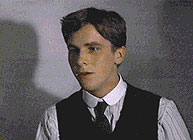|
|
|
|
The
Secret Agent
|
 |
|
The period film that strives to mix themes and moods of classic literary origin with more populist generic elements – traces of the horror movie, the romance or the action-mystery thriller – is an extremely difficult act to pull off. At least, this is what one must conclude from examples like Mary Reilly (1996) and The Secret Agent, adapted from a novel by Joseph Conrad. Whatever Hitchcock perfected in the era of Rebecca (1940) seems like a lost formula today. Hitchcock in fact used the same Conrad book as the basis for Sabotage (1936). This new version, keen to announce its grand artistic aspirations, builds a weighty, labyrinthine world around a simple plot. Verloc (Bob Hoskins) is a harassed agent forced into a shady, subversive intrigue by a foreign embassy in London. His marriage to Winnie (Patricia Arquette) is severely strained when a terrorist mission endangers her mentally disabled brother (Christian Bale). Writer-director Christopher Hampton (Carrington, 1995) has an odd, anachronistic sensibility. As if striving to create a composite of the worst dramatic elements from the works of Stephen Poliakoff, David Hare and Dennis Potter, Hampton serves up a dank stew of prurient sexual melodrama, a convoluted arthouse thriller plot, and laboured social allegory. As in Carrington, Hampton exhibits an almost drooling fascination with the bedroom fumblings of a dysfunctional, mismatched couple. It takes a long time for the film to establish the relevance of its prolonged scenes of impotence and coitus interruptus between Verloc and Winnie – and when the point is clarified by the denouement, the pay-off seems needlessly Gothic and trumped-up. Long, elaborate flashback structures – forming almost a parallel narrative to the present tense story – are becoming popular in cinema again. The back-and-forth switching in The Secret Agent creates neither suspense nor meaningful revelation. The flashbacks, combined with the requisite close-ups of actors looking introspective and tragic, serve only to announce the film's grandiloquent intentions, without lending them any substance whatsoever. The late nineteenth century setting allows Hampton to indulgently spray many a portent about the coming evils of our century – in particular, the rise of fascism. A code of evil amorality is embodied by a strange terrorist character played by Robin Williams, whose idea of straight dramatic acting is to set his face in a tense grimace and elevate his eyebrows, whilst whispering such arch lines as: "I am a force". Although Hampton evidences a little more control of film craft here than in Carrington, The Secret Agent is still a halting, clunky piece of work. Director of photography Denis Lenoir, noted for his desaturated colour work in the films of Olivier Assayas, is here called upon to produce a uniformly dark and murky look. And the scenes of political debate, where Hoskins, Gerard Depardieu and other serious gentlemen exchange sound bites encapsulating every major ideology of the period, are simply ridiculous. © Adrian Martin July 1997 |
![]()